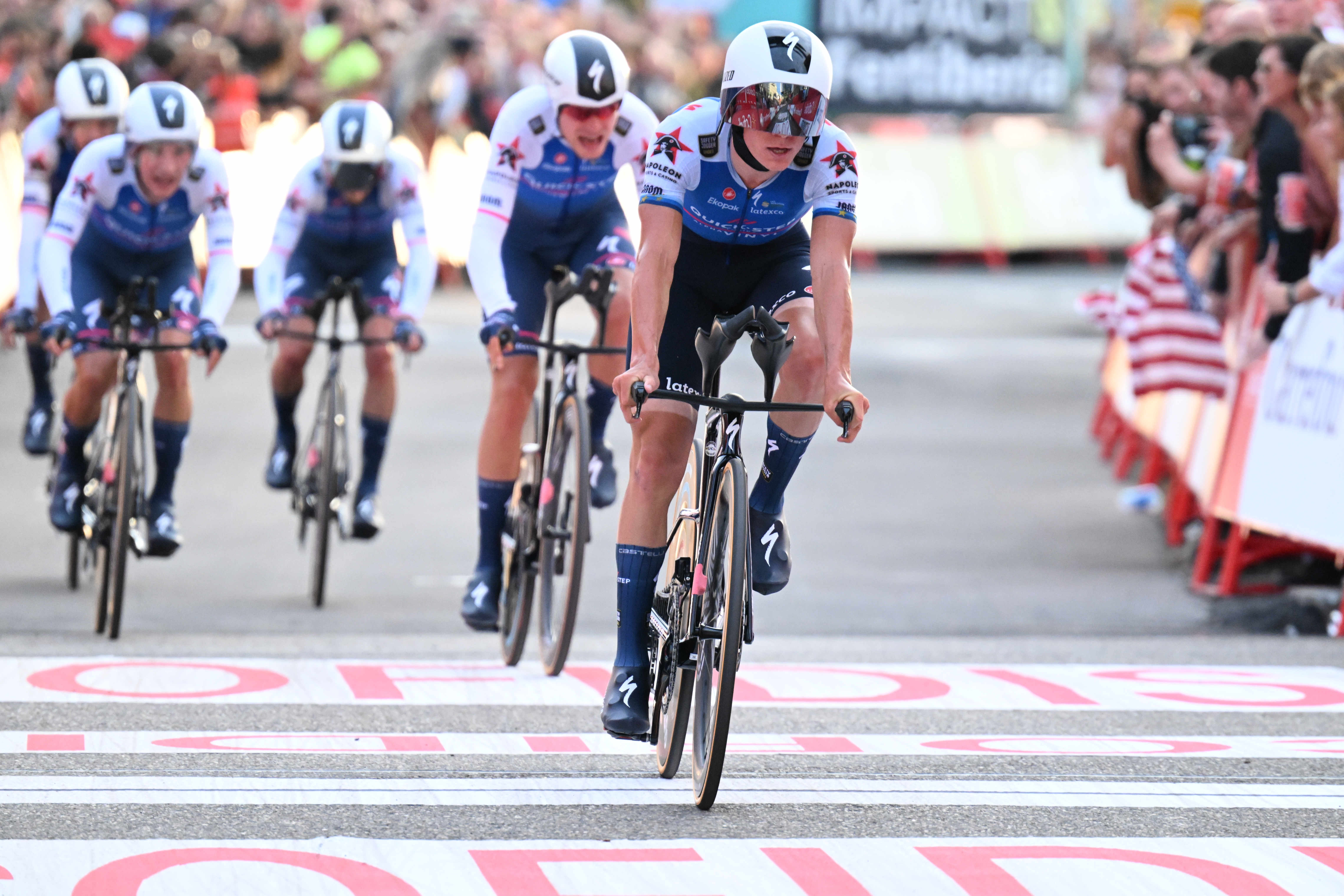Remco Evenepoel says Specialized head sock helmet 'a lot faster' after strong TTT start to Vuelta a España
Belgian showcases form in leading QuickStep-AlphaVinyl to third place and limiting losses to Roglic

Remco Evenepoel (Quick Step-AlphaVinyl) remained in an upbeat mood late on Friday evening as his team failed to take the opening team time trial of the Vuelta a España but nonetheless finished relatively close to stage winners Jumbo-Visma.
The Belgian team placed third, 14 seconds back on their Dutch rivals and just one second slower than another top GC team, Ineos Grenadiers.
Evenepoel’s hopes of snatching the victory were thus not realised, yet, as he explained to journalists afterwards, it was better to lose by what was, given the distance, a fairly large margin than suffer an agonisingly narrow defeat.
"Better that than lose by eight-tenths of a second to Ineos," he observed.
Asked directly by the media if he was happy with third, Evenepoel even was prepared to tone down any disappointment with a little humour, firing back an answer with his own question: "Yes. Why not? are you guys not satisfied?"
Speaking more seriously, he continued: "If you compare this team to Jumbo, their [average] weight is 10 kilos higher. We only have one heavier rider with Rémi [Cavagna]."
A hugely gifted time triallist himself, Evenepoel said: "I can be proud of the boys. We paced it all really well, with just one weaker moment, right after the first intermediate time split. Perhaps there we lost a bit too much."
Get The Leadout Newsletter
The latest race content, interviews, features, reviews and expert buying guides, direct to your inbox!
"But third at 14 seconds is really good. We don’t have riders here like [Kasper] Asgreen, [Yves] Lampaert, [Mattia] Cattaneo… These guys are better time triallists than the guys who are here, but that [having a strong TT team] was not our goal in this Vuelta."
Evenepoel admitted that while victory had been the goal, not having the pressure of leading the race so early was a point in their favour, but it was noted by the Belgian press that he had crossed the line in first place after stating earlier in the week that his goal had not been to take the lead.
Had QuickStep posted the winning team, he would have been in red, but that, he explained, had been due to his role in the overall strategy for the team time trial.
"At the last minute we said in the team meeting that if I was the strongest in the group, then I would pull for the last 500 metres," Evenepoel explained.
"I did long turns on the front, a kilometre long mostly. It was necessary to keep the pace high. If I had taken the red jersey we would have come up with a plan to give it away to a teammate; I could finish far down in the sprints.
"The finish line was also really narrow, therefore we said the strongest one goes first so the others can follow in my slipstream."
Just as it did earlier this year when worn by other riders, Evenepoel’s specially designed head sock helmet drew a lot of attention and divided option. It was the Specialized TT5 helmet that claims to save 26 seconds over a 40km time trial, and Evenepoel suggested those sort of benefits will be seen on the stage 10 individual time trial in Alicante.
"You will see that for me this helmet is a lot faster than the normal one," he said. "But you have to wait a good week for that."
The real question on Friday in Utrecht in any case was whether Evenepoel was satisfied with his Vuelta start, and the answer came back as a categorical 'yes'.
"Today wasn’t so much about the leader’s jersey, more about getting a stage win for the whole team," he explained. "But if we didn’t win, then we had to limit our losses and 14 seconds is not that much at all.
"Other teams have suffered much greater damage and all in all it's a great start. So now we’ll focus on the next two days, try and get through them unharmed, enjoy the rest day, and then the real Vuelta starts."
Alasdair Fotheringham has been reporting on cycling since 1991. He has covered every Tour de France since 1992 bar one, as well as numerous other bike races of all shapes and sizes, ranging from the Olympic Games in 2008 to the now sadly defunct Subida a Urkiola hill climb in Spain. As well as working for Cyclingnews, he has also written for The Independent, The Guardian, ProCycling, The Express and Reuters.
